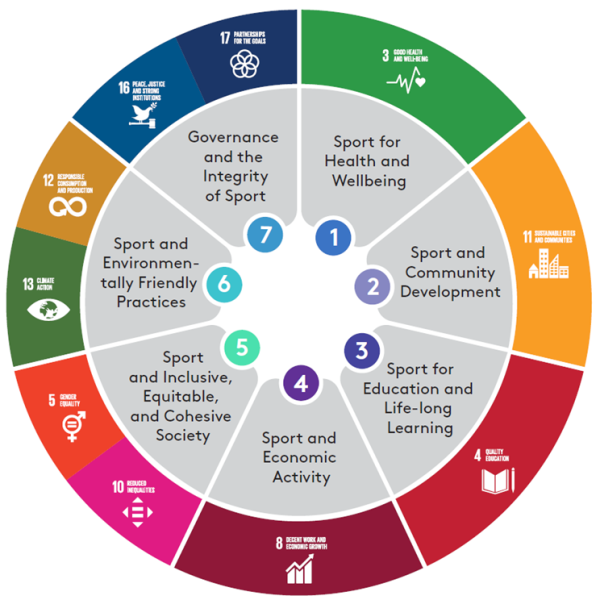
Exploring sport's role in achieving Sustainable Development Goals
By Benny Cullen
When people think about sport, what springs to mind are the images from television, newspapers and social media: sporting leagues, championships, and this year: Olympians and Paralympians competing at the highest level. While elite athletes represent an important part of sport, sport is so much more than what we traditionally see.
Sustainable Development Goals (SDG) week (September 20-29) is a great opportunity to explore the breadth of sports impact on our lives and in a recently published report, we have done exactly that by mapping the contribution of sport to the SDGs.
The research found that the sport sector in Ireland makes significant and direct contribution towards 10 SDGs under seven themes:
- Health and wellbeing
- Community development
- Education and life-long learning
- Economic activity,
- An inclusive, equitable, and cohesive society
- Environmentally friendly practices
- Governance and the integrity of sport.
Sport for good health and wellbeing: It is well known that sport and physical activity have positive effects on physical and mental health as well as personal wellbeing. During COVID-19 lockdown, we all went walking, running and cycling just to keep ourselves sane. The contribution of sport to health is startling.
Research has repeatedly shown that physically active individuals have lower mortality rates than those who are less active. Indeed, sports participation in Ireland prevented over 97,000 cases of illness in 2019, creating a net saving of €400m to the HSE. On the flip side physical inactivity is responsible for approximately 4,000 premature deaths in Ireland and costs the HSE €1.5bn a year.
Sport and economic activity: A less well-known fact about sport, is how significant a contribution it makes to the economy. Those who participate in sport spend, on average, €1,500 a year on their sporting activity between club memberships, equipment and event entries to spectate or participate.
A 2020 report on the Value of Sport in Ireland found that total sport-related expenditure is €3.7bn a year, making up 3.1% of all consumer expenditure and creating over 64,000 jobs, that’s 2.4% of all employment.
Sport for education and lifelong learning: An analysis of research studies across 50 years found that physical activity has a positive impact on children’s cognitive outcomes and academic achievement.
The 2013 ‘Keeping them in the Game’ report, commissioned by the Irish Sports Council and compiled by ESRI researchers, found that children who are physically active and participate regularly in sport are likely to have better academic performance than their inactive peers.
Research in the UK also found that participation in sport is also associated with higher incomes and promotes the development of valuable life skills such as teamwork, communication, leadership, and resilience, which boost employability and productivity.
Sport and community development: Sport is strongly rooted in community development. Through volunteering, coaching, club membership and spectatorship, sport has a unique way of bringing people together.
Volunteering is an integral part of community sport in Ireland. In 2023, one in 10 Irish adults volunteered in sport, generating an equivalent economic value of €1.5bn to Irish society. Sport can also reduce the barriers between people to bring a community together. As described by a community sports hub coordinator in Mayo “the new sports hub provides inclusive participation opportunities for all in a multicultural community.”
Sport for an inclusive, equitable and cohesive society: Sport can reduce social isolation and promote the integration of migrants and ethnic minorities, through active and social participation, thus advancing social cohesion.
As Ireland becomes more diverse, sport has the capacity to bring people from diverse backgrounds together around common passions. Sport can also play an important role in drawing attention to, raising awareness of and addressing social inequalities around gender, disability, ethnicity and socio-economic status.
The 2023 Irish Sports Monitor provides a history of how sports participation for these various groups has changed over the years. Although there is success in some areas such as the increases in female sports participation, there are other areas that need more work to promote an inclusive, equitable and cohesive society through sport.
Sport and environmentally friendly practices: Consumption and wastage of natural resources need to be acknowledged and addressed. Irish sport has the capacity to play a championing role in these areas by highlighting and making the changes necessary to protect the planet. This agenda provides huge opportunities to modernise sporting infrastructure and rethink our use of sport-related resources.
As an exemplar project, the Sport Ireland Campus Master Plan Vision was launched in 2022 outlining a blueprint of the proposed campus development which “seeks to ensure that sustainability and climate resilience are embedded into every aspect of the planning, design, construction and operation of the Campus”.
Governance and the integrity of sport: To ensure sustainable growth of sport in Ireland, it is essential to develop sporting organisations to be well governed, reliable and trusted institutions. Protecting the integrity of sport is one of the key objectives of Sport Ireland, which developed a Governance Code for Irish sporting organisations, supported with an upskilling and training programme.
Sport Ireland also operates safeguarding programmes for sport and developed a new code of conduct template for all those involved in sport.
Promoting good governance and ethical behaviour in sport will help to build public trust and confidence in sport and the broad benefits it can offer to sustainable development in Ireland.
Benny Cullen is Director of Research and Innovation at Sport Ireland
